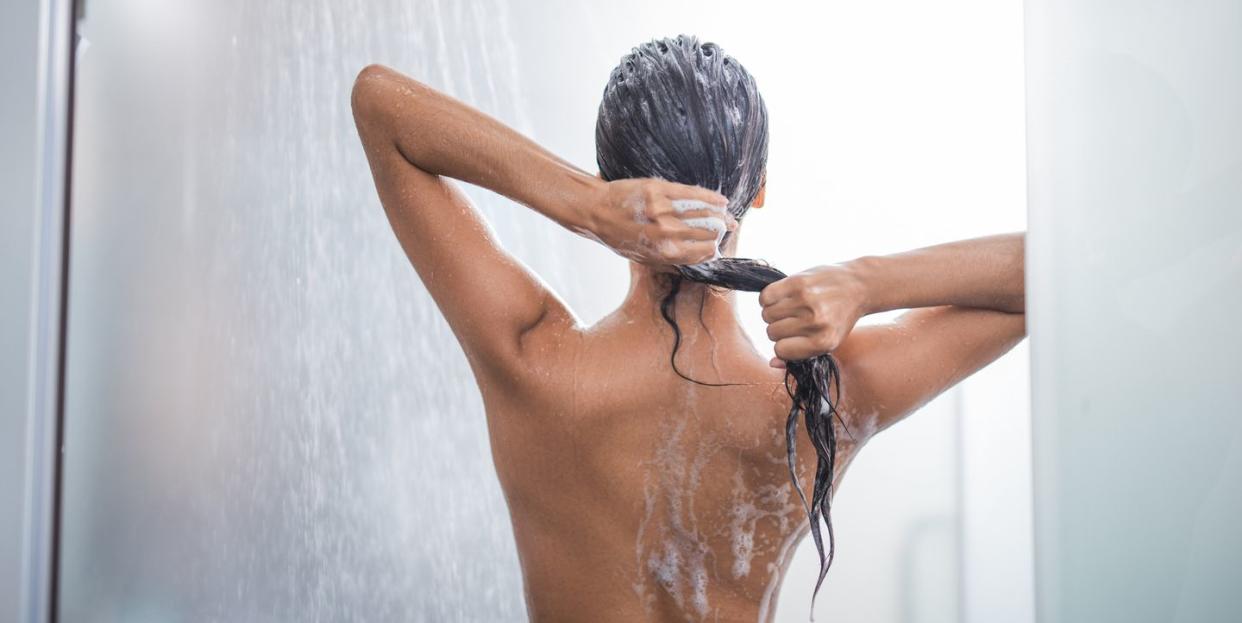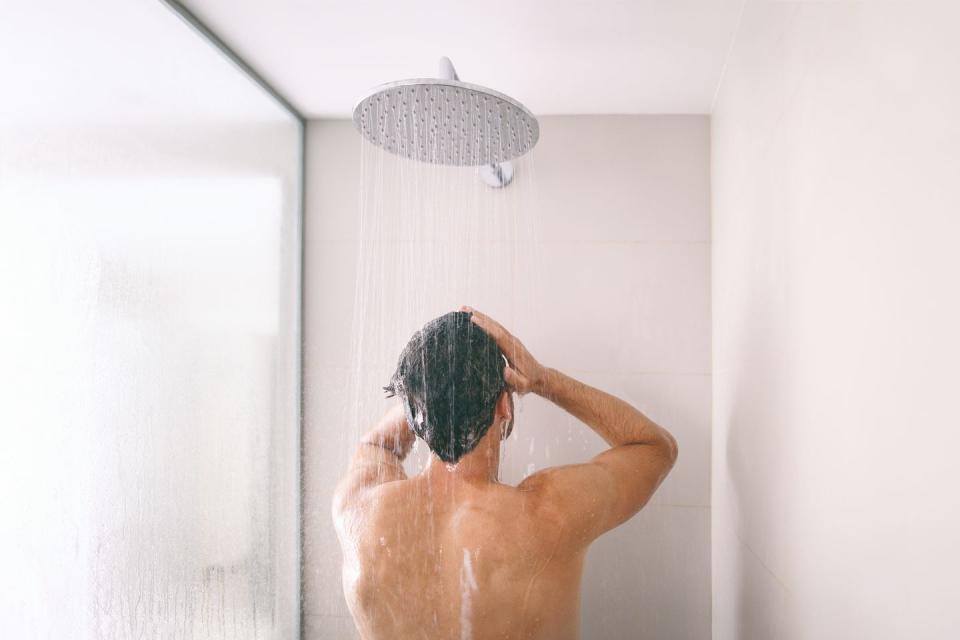Why You Should Take a Cold Shower Tomorrow Morning

If you’ve ever had the water suddenly turn frigid when you’re taking a shower, you know how shocking it can be. A cold shower may not sound enticing, but it turns out there may be some mental and physical health benefits if you lower the water temp a bit. (There must be a reason why so many people participate in polar bear plunges and cold shower TikTok challenges, right?)
Research published about what happens when you expose yourself to cold water is limited, so we reached out to experts who study cold therapy to sort out the potential benefits of taking a cold shower.
What is cold therapy?
The technical name for cold therapy is “cryotherapy,” and that’s an umbrella term that includes things like cold showers, cool-air body chambers and full-body immersion in cold water. “The definition of cryotherapy is the reduction of tissue temperature by the withdrawal of heat from the body where you take something that’s cold, and you apply it to your body which is warm and then the temperature transfers from warm to cold,” explains Susan Kwiecien, Ph.D., a clinical research manager at the Nicholas Institute of Sports Medicine and Athletic Trauma in New York City. So essentially, if you sprain your ankle and apply an ice pack to cool the inflamed area, you’re using a form of cold therapy.
Cold shower health benefits
Taking a cold shower may benefit your health in a number of ways:
Boost alertness.
“We know cold water stimulates the cold shock response and the release of stress hormones that prepare the body for ‘fight or flight,’” says Mike Tipton, Ph.D., a professor in the Extreme Environments Laboratory at the University of Portsmouth, UK. In fact, in one non-peer reviewed study showed that people who immersed their bodies (except for their heads) in cold water for five minutes reported feeling more enthusiastic, active and alert. “But the research is so limited that there really isn’t anything to say yes, for sure — but anecdotal evidence is fine in this case,” says Kwiecien.
Think about it: If you’re healthy and a short cold shower helps wake you up in the morning and means you’ll drink one fewer cup of coffee, there’s no harm in giving it a shot.
Lower inflammation.
“Animal literature shows that if applied correctly, cryotherapy can decrease inflammation by reducing metabolic rate,” says Kwiecien. “Why you you’d want to decrease inflammation is because after you’ve had an injury or after exercise, your body goes through an inflammatory process. Inflammation is both good and bad, and the point of cryotherapy is to reduce the amount of bad inflammation so that good inflammation can occur sooner.”
However, time is of the essence — the earlier you can apply cold therapy, the more likely it is to help. “The inflammatory process happens instantly,” says Kwiecien. “You might not even be feeling it yet, but it’s already happening in your body and if you wait too long past that initial inflammatory stage, the cryotherapy won’t have an effect.”

Alleviate pain.
A 2021 review of 22 studies found that regular use of cryotherapy can be a low-risk way to ease chronic pain. Exposure to cold temps may help reduce inflammation, nerve transmission and oxidative stress — all of which can contribute to pain. Of course, there’s no guarantee it will help, but if you’ve ever felt relief after applying an ice pack on a painful bruise or sore muscle, you know there’s a chance it could be effective.
Support mental health.
Cold showers and cryotherapy in general are not replacements for talk therapy or any prescription medications you may be taking to address mental health issues, but some research shows they could be an effective complementary treatment. In fact, one study found that people who did 10 sessions of cryotherapy experienced a decrease in depressive symptoms and improvements in mood and quality of life.
Improve immunity.
Again, the research here is scant, but one study found that people who started their showers with warm water and finished them with cold water missed 29% fewer days of work due to sickness even though they reported being sick the same number of days as people who took only warm showers. This suggests that maybe their symptoms were less severe, but scientists aren’t sure of the exact mechanism by which cold therapy could bolster your immune system.
How to safely take a cold shower
“Taking a cold shower isn’t unsafe, but if people try to push their limits beyond what they are used to on a daily basis, it can be unsafe,” says Kwiecien. “It is a shock to the system. It does increase your heart rate in that instant where you do change your exposure from warm water to freezing cold water.”
For that reason, it’s best to consider these safety tips before you turn your shower dial from red to blue:
[accordion id='cb000128-450e-4347-8f4f-ae5dbade73a0'][/accordion]
FAQ
Why isn’t there more research on cold therapy?
“Scientifically, the data supporting cryotherapy stems from research done in animals and unfortunately, a lot of the research proving that cryotherapy is beneficial in animals just has not been translated into humans,” says Kwiecien. One reason why there may not be more human-centered research on cold therapy is that it can be challenging to design high-quality studies that control for all variables and accurately measure the effects of cold therapy.
Kwiecien says it's particularly difficult to replicate the dosage of cold therapy. If you put an ice cube on a mouse, for instance, that’s going to easily cover a large amount of animal’s surface area, but you would need a gigantic ice cube to cover the same proportion of skin on a person. “It’s hard to actually say what the benefits are because we’re inferring from animal models,” says Kwiecien. “That’s not to say that in the future, we won’t be able to show it in humans. It’s just hard to get there safely.”
What is the best temperature for a cold shower?
“Most people think you need to feel discomfort for the cryotherapy to have an effect — like the colder, the better,” says Kwiecien. “But there is recent research from the last three or four years to actually show that that is absolutely not true at all. In fact, a more moderate temperature is physiologically more beneficial for you.”
No one knows for sure, but she says some current data points to 59°F (or 15°C) as the magic number. When you expose yourself to freezing cold, deep tissues begin to shiver and a prolonged shivering response may impede recovery. “But with a mild cold temperature like 59°F, you don’t have that shivering response in deep tissue,” she adds. “You avoid it completely while still accomplishing reductions in tissue temperature.” That said, Kwiecien notes that you really don’t need to hold a thermometer under the showerhead — just choose a water temp that feels chilly and doesn’t cause you to shiver.
How long should a cold shower last?
This varies from person to person. Some experts say just 60 seconds can help, while others say working up to a longer amount of time is better. “Research has shown that you get much better results in terms of recovery if you prolong the duration of cooling. Plus, you’ll be able to stand under water that is 59°F for much longer than you would be able to stand under water for if it was freezing cold,” says Kwiecien.
Is a hot shower ever better for you?
The answer depends on what your goal is. If you just want to relax, a warm shower may deliver what you’re looking for better than a cold shower can. The other instance in which a warm shower can be more beneficial than a cold one is if you’re trying to build muscle mass. “Chronic exposure to cryotherapy in people who are trying to gain muscle is actually detrimental,” says Kwiecien. “It doesn’t allow the muscle to grow and multiply.” That’s because exposure to cold temps constricts blood vessels while exposure to warm temps dilates them and promotes more blood flow. If for instance, you’re training for a marathon and you have a long run scheduled, Kwiecien says a warm shower the day before might help prime your muscles for it, but if you’re on a three-day ski trip, and you want to avoid soreness, a cold shower each night of the trip might help soothe sore muscles by slowing inflammation.
You Might Also Like

